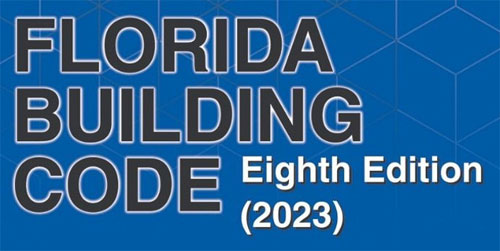1. Introduction to the Florida Building Code
The Florida Building Code is a comprehensive set of regulations that ensure the safety, durability, and sustainability of all building projects in Florida. With the frequent occurrence of hurricanes and other extreme weather conditions in the state, Florida’s stringent building standards help mitigate the risks of property damage and loss of life. The Florida Advanced Building Code Course is designed to provide professionals with an in-depth understanding of the latest version, the 8th Edition, and how it impacts their work.
Advanced Internet Course in Significant Florida Building Code Changes 8th Edition (2023)
2. The Evolution of the Florida Building Code
The Florida Building Code has evolved significantly since its inception. Originally derived from various regional building standards, the state consolidated these rules into a unified code in 2002. Each edition brought improvements, and the 8th Edition represents the latest iteration, incorporating lessons learned from previous hurricane seasons and advancements in construction technology. Understanding this evolution is crucial for professionals aiming to stay compliant and up-to-date.
3. Why the 8th Edition Matters
The 8th Edition of the Florida Building Code includes essential updates that affect all stakeholders involved in construction and design. It focuses on enhanced safety measures, improved energy efficiency, and the integration of modern building materials. Some of the key changes in this edition include more detailed provisions for coastal construction and stricter requirements for wind resistance.
4. Understanding the Structure of the 8th Edition
The Florida Building Code is organized into several volumes, each dedicated to a specific aspect of construction. The 8th Edition retains this structure, with sections on building, mechanical, plumbing, and energy conservation codes. This modular design makes it easier for professionals to navigate the code and apply the relevant standards to their projects.
5. Key Features of the 8th Edition
Some of the most notable features of the 8th Edition include revised wind-load calculations, updated energy conservation requirements, and new guidelines for resilient construction. These updates reflect Florida’s ongoing efforts to protect its built environment from natural disasters while ensuring energy efficiency and sustainability.
6. How the 8th Edition Impacts Building Projects in Florida
For contractors, architects, and engineers, the 8th Edition of the Florida Building Code introduces new compliance challenges. Projects must meet updated criteria for structural integrity, particularly in high-risk areas. Additionally, the energy conservation standards in the 8th Edition require buildings to be more efficient, which may necessitate the use of advanced materials and systems.
7. Florida Advanced Building Code Course Overview
The Florida Advanced Building Code Course is specifically designed to help professionals navigate the complexities of the 8th Edition. It covers critical topics such as structural requirements, energy efficiency provisions, and the permitting process. By completing this course, professionals can ensure they are applying the latest standards in their work.
8. Course Requirements and Eligibility
To enroll in the Florida Advanced Building Code Course, participants must have a background in construction or a related field. The course is aimed at licensed professionals such as contractors, architects, and engineers. Upon completion, students will receive a certificate, which can be used to meet continuing education requirements.
9. Learning Outcomes from the Florida Advanced Building Code Course
Students will come away from the course with a thorough understanding of the 8th Edition and how to apply it in real-world scenarios. Key competencies include interpreting code requirements, applying energy efficiency standards, and ensuring compliance with structural regulations.
10. Benefits of Completing the Course
By completing the Florida Advanced Building Code Course, professionals gain a competitive edge in the marketplace. Not only does certification demonstrate expertise in the latest building codes, but it also helps professionals avoid costly mistakes and delays in project approvals. Furthermore, certified individuals can offer their clients peace of mind, knowing their projects are compliant with the most current regulations.
11. How to Enroll in the Florida Advanced Building Code Course
Enrolling in the course is a straightforward process. Interested individuals can register through the official website of the Florida Department of Business and Professional Regulation (DBPR) or other approved course providers. The course typically spans several weeks and can be completed online or in person.
12. Continuing Education Credits and Recertification
The Florida Advanced Building Code Course is recognized for continuing education credits, which are mandatory for maintaining licensure in Florida. After completing the course, professionals will need to participate in ongoing education to stay up-to-date with future editions of the Florida Building Code.
13. Key Differences Between the 7th and 8th Editions of the Florida Building Code
For professionals familiar with the 7th Edition, it’s essential to recognize how the 8th Edition differs. Here are some key distinctions:
- Wind Load Calculations: The updated edition provides more detailed wind-load provisions, particularly for high-velocity hurricane zones. This is a critical change for ensuring structural integrity in regions most affected by tropical storms.
- Energy Conservation Enhancements: The 8th Edition pushes for further energy efficiency, requiring higher standards for insulation, HVAC systems, and overall building design. This means that new builds need to focus more on sustainable materials and energy-saving designs.
- Stricter Coastal Construction Regulations: In response to rising sea levels and the increasing severity of storms, the 8th Edition includes more robust rules for coastal properties, making them more resilient to floods and erosion.
- Updated Fire Safety Measures: Enhanced fire safety requirements are a significant addition, particularly for multi-story buildings, which must now include improved fire prevention technologies and safety protocols.
These changes highlight the importance of staying informed about the latest version of the code, as even minor differences can have a major impact on compliance and project execution.
14. Expert Opinions on the 8th Edition and the Course
Experts in the field widely acknowledge the importance of the Florida Advanced Building Code Course. According to building code specialists, the course provides invaluable insights that are essential for ensuring compliance with the 8th Edition. Professionals who have completed the course report increased confidence in handling code-related challenges.
15. FAQs about the Florida Advanced Building Code Course
What is the cost of the course?
The cost of the course varies depending on the provider but typically ranges between $15 and $100.
How long is the course?
The course duration is usually 30 to 40 hours, with both online and in-person options available.
Is the course mandatory for all professionals?
No, the course is not mandatory for all professionals, but it is highly recommended for those involved in construction, architecture, and engineering.
How often is the Florida Building Code updated?
The Florida Building Code is updated every three years, with each edition incorporating new standards and best practices.
What is the passing grade for the course?
To pass the course, participants typically need to score 70% or higher on the final exam.
Can I retake the exam if I fail?
Yes, most course providers allow participants to retake the exam after a waiting period.
16. Conclusion
In conclusion, the Florida Advanced Building Code Course 8th Edition is an essential resource for construction professionals looking to stay current with the latest standards. By completing the course, individuals gain a comprehensive understanding of the 8th Edition and its practical applications, ensuring they are well-equipped to meet Florida’s stringent building requirements.


